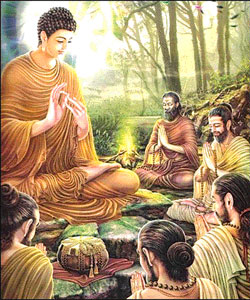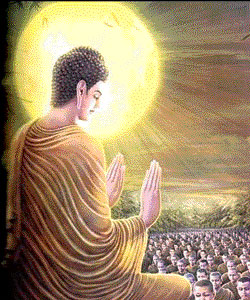|
The 2600th anniversary of the Buddha's Enlightenment:
Buddhism: A cross between philosophy and religion
by R.S Karunaratne
May is the most important month in the Buddhist calendar. The Vesak
Full Moon Poya Day which falls on May 17 is extremely significant for
over 350 million Buddhists spread throughout the world because it marks
the existence of their religion for 2,600 years.
  On
this Vesak Poya Day the 2600th anniversary of Enlightenment which is
called the 'Sambuddhathva Jayanthi' will be celebrated on a grand scale.
A number of elaborate arrangements are being made in many countries to
celebrate the event. On
this Vesak Poya Day the 2600th anniversary of Enlightenment which is
called the 'Sambuddhathva Jayanthi' will be celebrated on a grand scale.
A number of elaborate arrangements are being made in many countries to
celebrate the event.
Sri Lanka, more than any other country, can boast of being the
repository (place or store house) of pure Theravada Buddhism. From the
day Buddhism was introduced to Sri Lanka by Arahant Mahinda during King
Devanampiya Tissa's reign, it has remained the state religion for many
centuries.
Although the Portuguese, the Dutch and the British propagated various
other religions, Buddhism was not banished from the country. Buddhist
temples were destroyed en masse (all together) by the invading armies
and bhikkhus were driven away from their abodes. However, Buddhism could
not be wiped out.
Although Buddhists did not wage war against the invaders to protect
their religion, they demonstrated their tolerance and patience with
their enemies.to regain the position enjoyed by them.
Even before the western powers arrived on the island, and occupied
the maritime provinces for more than four centuries, South Indian
invaders dealt a severe blow to Buddhism by ruling the Anuradhapura and
Polonnaruwa kingdoms for a long time.
Buddhist monks and laymen faced such calamities stoically (without
complaint) and ultimately regained their lost rights and privileges.
Today Buddhism is so firmly rooted in the country that it will
continue to be the centre of Theravada tradition in the entire
world.Although Buddhism did not flourish in the country of its origin -
India - due to the overwhelming Hindu influence, Sri Lanka has been able
to maintain the status of the religion for many reasons.
For instance, Buddhism is a great philosophy and also a system
supported by age-old rituals. Instead of propagating the religion
through unethical means, Buddhism leaves its doors open for anyone to
accept or reject it. In fact, the Buddha never expected anyone to accept
his doctrine without questioning.
The Buddha,usually referred to as the "Light of Asia", was a
wandering teacher who lived in the sixth century BC. He taught a new
religion to the people in the kingdom of Magadha. His teachings were
embraced by millions of followers for well over 2,500 years.
Gauthama Buddha is different from other religious leaders because He
never claimed to be a god.
He was born as Prince Siddhartha in 624 BC and led a comfortable life
in his palace. However, at 29 He renounced his worldly pleasures and
became a wandering ascetic.
For well over six years He placed himself under different teachers
and then practised austerities until He discovered for Himself the
knowledge He had been seeking.
He attained Enlightenment or Buddhahood in 589 BC.The Buddha preached
His doctrine for 45 years to his disciples and followers.
In 544 BC the Buddha attained Parinibbana.
The Enlightened One visited Sri Lanka on three occasions and one
occasion He left His footprint on Samanthakuta (Adam's Peak). Although
Buddhism is no longer the major religion in India, in the Maha
Parinibbana Sutta He speaks of four places any Buddhist should visit.
The first is the place where Prince Siddhartha was born. The second
is the place where He attained Enlightenment.The third is where
He delivered His first sermon- Dhammacakkapavattana Sutta. And the
fourth is the place where the Buddha attained Parinibbana.The impact of
Buddhism on our culture and civilisation has made Buddhists tolerant of
all other religions.
It promotes discussions, debates and counter arguments.
It is a religion that invites anybody to investigate and then accept
what the Buddha preached..Since Buddhism is of cross between philosophy
and religion it appeals to many segments of society.
The Buddha was the greatest philosopher and it is a foregone
conclusion.
Those who are not so philosophically inclined may approach Buddhism
as a system of practices and rituals that pave the way for a happy and
contented life in this world and beyond. |

